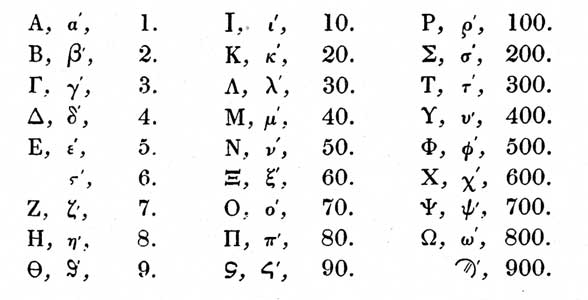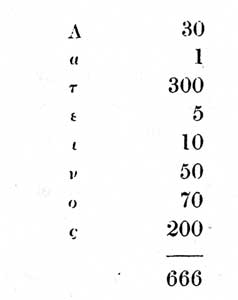| THE NUMBER OF THE BEAST |
|---|
| 18 Here is wisdom. He who has understanding, let him calculate the number of the beast, for it is the number of a man. His number is six hundred sixty-six. |
| Rev 13:18 Let him who has understanding calculate the number of the beast, for that number is the number of a man – the Greek scholar Kenneth Wuest wrote: “There are two words in Greek which mean ‘man,’ anēr, which refers to a male individual of the human race, and anthrōpos, which is the racial, generic term, and which has the general idea of ‘mankind’ ” (K. Wuest, Great Truths to Live By, 46). Here, John has used the word “anthropos,” which Kenneth Wuest tells us would be used for a specific race of people. The highly probable answer to this riddle was related to us by Irenaeus in 180. He was a hearer of Polycarp, who was a disciple of the Apostle John. In his Book, Against Heresies, Book 5, Chapter 30, Paragraph 2, he wrote: ” Then also Lateinos (ΛΑΤΕΙΝΟΣ) has the number six hundred and sixty-six; and it is a very probable [solution], this being the name of the last kingdom [of the four seen by Daniel]. For the Latins are they who at present bear rule: I will not, however, make any boast over this.” Within twenty years, this would be the proven answer of John’s riddle. Every letter of the Greek alphabet is a number, so John’s meaning was very clear to his readers.  Lateinos spells 666 below:  Lateinos has always been the most accepted solution to John’s riddle for several reasons: ① The Latins were from Rome, and conquered Italy in the third century BC. ② Irenaeus mentions the fourth kingdom of Daniel’s prophecy, but more significantly, Lateinos fits the description of “the people of the ruler to come” Dan 9:26; who would put an “end to the daily sacrifice” by crucifying Christ, and set up “the abomination of desolation,” Dan 8:11, 11:31, through the Bishop of Rome. ③ It had to be a solution his readers would have been familiar with. John asked his immediate readers to calculate its meaning. His immediate readers were the Churches of Asia, who read in Greek and likely did not know Latin. Some have tried to calculate using Latin numbers, but this would not be appropriate for John’s readers. ④ The answer of Lateinos was revealed to us by Irenaeus a hearer of Polycarp, who was a disciple of John. ⑤ It was publicized at least 13 years before the beast appeared. The solution needed to be timely for the saints to understand it. ⑥ Lateinos not only describes the power from Rome, but also Latin Christianity, which corrupted the gospel, beginning with Tertullian in A.D. 200. ⑦ Lateinos describes the three Latin speaking states, that “the little horn” subdued in Dan 7:8,24, being Spain, France, and Italy. We might also ask, why did God give us a hint using these three numbers, 666? The number itself shows us the imperfection of Latin theology. The number 7 represents “completion,” and the number 6, is less than perfect. Three imperfections came by Tertullian, the Father of Latin Christianity. There were “three measures of meal” into which the woman hid her leaven (Matt 13:33). Tertullian said the water used for baptism had no relevance; he proposed the Trinity; and defended Sunday rest. (Ad Nationes, Chapter 8) |
